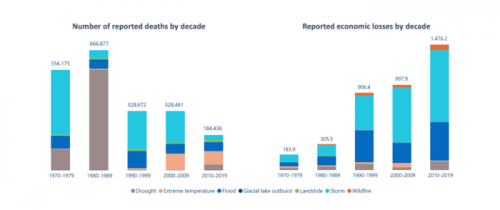
https://public.wmo.int/en/media/press-release/economic-costs-of-weather-...
Geneva, 22 May 2023 (WMO) - Extreme weather, climate and water-related events caused 11 778 reported disasters between 1970 and 2021, with just over 2 million deaths and US$ 4.3 trillion in economic losses, according to a new figure from the World Meteorological Organization (WMO).
Economic losses have soared. But improved early warnings and coordinated disaster management has slashed the human casualty toll over the past half a century. Over 90% of reported deaths worldwide occurred in developing countries.
The USA alone incurred US$1.7 trillion, accounting for 39% of economic losses worldwide in the 51 years. But Least Developed Countries and Small Island Developing States suffered a disproportionately high cost in relation to the size of their economies.
WMO issued the new findings for the quadrennial World Meteorological Congress, which opens on 22 May with a high-level dialogue on accelerating and scaling up action to ensure that early warning services reach everyone on Earth by the end of 2027.
The United Nations Early Warnings for All initiative is one of the top strategic priorities due to be endorsed by the World Meteorological Congress, WMO’s top decision-making body. The high-level session will be opened by Swiss President Alain Berset and brings together top representatives of UN agencies, development banks, governments and national meteorological and hydrological services responsible for issuing early warnings.
“The most vulnerable communities unfortunately bear the brunt of weather, climate and water-related hazards,” said WMO Secretary-General Prof. Petteri Taalas.
“Extremely severe cyclonic storm Mocha exemplifies this. It caused widespread devastation in Myanmar and Bangladesh, impacting the poorest of the poor. In the past, both Myanmar and Bangladesh suffered death tolls of tens and even hundreds of thousands of people. Thanks to early warnings and disaster management these catastrophic mortality rates are now thankfully history. Early warnings save lives.”
WMO compiled the figures as an update to its Atlas of Mortality and Economic Losses from Weather, Climate and Water Extremes, which initially covered the 50-year period 1970-2019, based on Centre for Research on the Epidemiology of Disasters’ (CRED) Emergency Events Database (EM-DAT.
Recorded deaths for 2020 and 2021 (22 608 deaths in total) indicate a further decrease in mortality relative to the annual average of the previous decade. Economic losses increased – most of them attributed to storm category.
Key findings:
- Over sixty percent of economic losses due to weather-, climate- and water-related disasters were reported for developed economies. However, the economic losses were equivalent to less than 0.1% of the gross domestic product (GDP) in respective economies in more than four fifths of these disasters. No disasters were reported with economic losses greater than 3.5% of the respective GDPs.
- In Least Developed Countries, 7% of disasters for which economic losses were reported had an impact equivalent to more than 5% of the respective GDPs, with several disasters causing economic losses up to nearly 30%.
- In Small Island Developing States, 20% of disasters with reported economic losses led to an impact equivalent to more than 5% of the respective GDPs, with some disasters causing economic losses above 100%.










Add new comment